Michael D. Amey
Welcome back to our posts on dystopian narratives. In this post, I’m going to begin by examining the teachings of Karl Marx and Friederich Engels as expressed in The Communist Manifesto. Once I have provided a basic overview of some of his theories, I will examine Fritz Lang’s extremely influential movie, Metropolis, paying close attention to how Marxist theory informs this film.
The Communist Manifesto: A Defunct Ideology?
 The fall of Communism in Europe during the late ‘80s and early ‘90s, indicated to many people, particularly in the United States and Europe, that Marxism was an inherently flawed system that could not be practically applied. The history of Soviet oppression and domination, a history which prompted President Reagan to label the Soviet Union the Evil Empire, suggested that Marxist utopianism not only did not work, it shouldn’t even be attempted. Certainly, nothing about the Soviet Union and its Eastern-block allies suggested that the classless, stateless utopian society envisioned by Marx and Engels had been achieved.
The fall of Communism in Europe during the late ‘80s and early ‘90s, indicated to many people, particularly in the United States and Europe, that Marxism was an inherently flawed system that could not be practically applied. The history of Soviet oppression and domination, a history which prompted President Reagan to label the Soviet Union the Evil Empire, suggested that Marxist utopianism not only did not work, it shouldn’t even be attempted. Certainly, nothing about the Soviet Union and its Eastern-block allies suggested that the classless, stateless utopian society envisioned by Marx and Engels had been achieved.
While Marxism was never successfully implemented, Marx’s and Engels’ insights into the structuring of society, the creation of identity, and the forces that drive history are particularly useful for anyone studying the concepts of utopia and dystopia. Indeed, both Engels and Marx clearly understood that their ideas were related to utopian projects, but they rejected utopianism as unscientific. In fact, as you will notice when you read The Communist Manifesto, Marx and Engels were careful to distinguish communism from other “impractical” utopian projects. Several decades after publishing The Communist Manifesto, Engels developed his criticism of the utopian planners in his study, The Development of Socialism from Utopia to Science. His argument, which was levied primarily against the French utopian socialists mentioned in The Communist Manifesto, was that their utopias were unscientific, while Marxism was based on science (Booker 1994, 33). Marxism, according to Engels and Marx, was the product of the scientific study of history. Through this careful, scientific study of the trajectory of history, they believed that they could predict both future social developments, and, in a sense, the end of history. What follows is a brief description of key Marxist concepts, which will help you understand Marxist criticism, The Communist Manifesto and Fritz Lang’s movie, Metropolis.
Based on what I’ve just said, it should be evident that Marxism is heavily indebted to the study of history. The Marxist approach to historical study is frequently termed historical materialism. The concept underlying historical materialism is suggested by Marx’s statement in his Preface to A Contribution to the Critique of Political Economy that “it is not the consciousness of men that determines their existence, but, on the contrary, their social existence that determines their consciousness”. What Marx was arguing was that our society, including how our society produces and uses things, determines to a large extent how we view the world.
An Example of Consciousness Shaped by Society: What Would You See?
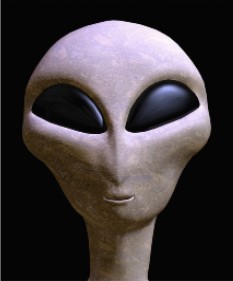

Consider for a moment, which of these two images you would be least surprised to encounter on a walk in the woods. Sighting either of them would certainly constitute a departure from ordinary life. Most Americans, however, would discount the fairy as an imaginary creature. Indeed, fairy tales refer specifically to stories that are clearly untrue. By contrast, some Americans would be predisposed to accept the existence of an extra-terrestrial. In the Middle Ages, however, people would have accepted the possibility of the fairy, but would not have been able to even conceive of the idea of the extra-terrestrial. It’s worth noting that conceptually, fairies and extra-terrestrials are very similar. Both “species” are alleged to have extraordinary powers and both “species” reportedly kidnap humans. What differentiates these two “species” are the social assumptions underlying them. Fairies are “supernatural” beings. Extra-terrestrials, by contrast, are “scientific” beings, who supposedly travel through space in UFOs. A medieval citizen would be unable to conceptualize an alien because his or her social framework would have lacked any reference to space age technology. By contrast, modern Americans frequently, albeit not always, discount the supernatural. Science and technology pervade our world, and as a consequence we look for scientific and technological explanations for the phenomenon we encounter. As Marx says, our social existence determines our consciousness.
Marx and Engels understood that our modern consciousness is, in fact, shaped both by capitalist production and consumption. On a very basic level, our existence as producers / consumers impacts how we see the world. For example, few of us think twice about “marketing ideas” or “marketing people”. Clearly, an individual who markets himself is one who successfully presents himself as a product for consumption. This image is only possible in a society where producing, marketing and selling things is the primary means of making a living. Likewise, the concept that we can “market” an idea indicates our belief that ideas are produced just like material objects. Indeed, our intellectual property laws stem from the fact that we see both tangible and intangible things as objects that can be possessed and traded. Even our concept of wage labor suggests that time is a commodity that can be sold and consumed. Thus a lawyer will tell her client that she is on the clock, indicating that the client will be billed for the use of that time.
Along with arguing that consciousness is shaped by society, Marx and Engels believed that “The history of all hitherto existing society is the history of class struggles” (The Communist Manifesto). History, according to their theory moved forward through class struggles. Each step led inevitably to the next step. The final step would be when the proletariats (workers) violently overthrew the bourgeoisie (capitalists) and established a dictatorship of the workers. With property centralized in the hands of society and used for the benefit of all, social class would eventually fade away. From that point on, of course, class struggles would end, and history, as envisioned by Marx and Engels, would cease to exist. It is worth noting that in many texts describing utopian societies, the success of those societies depends on the elimination of private property and class. In these narratives, the accumulation of private property is seen as the primary cause of social injustice, warfare and unhealthy competition. The eventual disappearance of social injustice, warfare and unhealthy competition allows society to become static and unchanging.
By contrast, dystopian narratives frequently borrow from Marx and highlight the social disruption caused by class conflict. In 1984, George Orwell specifically identifies the proletarians as subversive (and strangely free) members of society. More traditionally, in Fritz Lang’s Metropolis warfare between the workers (hands) and the capitalists (minds) is only barely prevented by Freder, the mediator (heart). This conclusion is foretold in 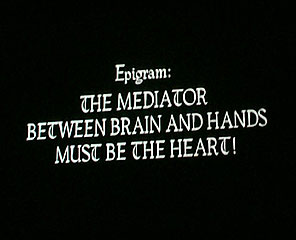 the opening Epigram, which states “The mediator between head and hands must be the heart”. Marx and Engels, of course, would have dismissed the proposal that there could be a mediator between the head and hands as preposterous. Undoubtedly, they would call in to question Freder’s motives and would argue that Freder’s actions, far from radically transforming society, simply ensures that the status quo is maintained. Their criticism would most likely mimic their criticism of bourgeoisie sympathizers in The Communist Manifesto:
the opening Epigram, which states “The mediator between head and hands must be the heart”. Marx and Engels, of course, would have dismissed the proposal that there could be a mediator between the head and hands as preposterous. Undoubtedly, they would call in to question Freder’s motives and would argue that Freder’s actions, far from radically transforming society, simply ensures that the status quo is maintained. Their criticism would most likely mimic their criticism of bourgeoisie sympathizers in The Communist Manifesto:
A part of the bourgeoisie is desirous of redressing social grievances in order to secure the continued existence of bourgeois society.
To this section belong economists, philanthropists, humanitarians, improvers of the condition of the working class, organizers of charity, members of societies for the prevention of cruelty to animals, temperance fanatics, hole-and-corner reformers of every imaginable kind. This form of socialism has, moreover, been worked out into complete systems. …
They desire the existing state of society, minus its revolutionary and disintegrating elements. They wish for a bourgeoisie without a proletariat. The bourgeoisie naturally conceives the world in which it is supreme to be the best; and bourgeois socialism develops this comfortable conception into various more or less complete systems. In requiring the proletariat to carry out such a system, and thereby to march straightaway into the social New Jerusalem, it but requires in reality that the proletariat should remain within the bounds of existing society, but should cast away all its hateful ideas concerning the bourgeoisie.
The criticism that Marx and Engels offer here certainly illuminates some of the problems with Metropolis. While Freder is able to negotiate a reconciliation between the chief-foreman of the Heart Machine, Grot, and his father, Joh Fredersen, there is nothing in the movie that suggests that the reconciliation will substantially change the roles of either the workers or the capitalists. Indeed, one can suppose that having done his bit, Freder will retreat to the Eternal Gardens to live out his days with Marie. Beyond the symbolic  gesture Freder makes earlier in the movie by working one shift for Worker 11811, there is no evidence suggesting that he is either willing to give up his luxuries or that he is willing to actually work.
gesture Freder makes earlier in the movie by working one shift for Worker 11811, there is no evidence suggesting that he is either willing to give up his luxuries or that he is willing to actually work.
Marx and Engels would have also undoubtedly dismissed the conditionality of Freder’s horrified question to his father, “What if one day those in the depths rise against you?” For them, it was not a matter of “if” but “when”. They saw the eventual revolution as a historical inevitability. Although they saw this revolution as the unavoidable consequence of capitalist society, Marx and Engels did not see individuals as acting in predetermined ways. They believed in a the possibility of action as is evidenced by Marx’s assertion, “The philosophers have only interpreted the world, in various ways; the point is to change it” (Theses on Feuerbach). Thus, while conflict between the proletariats and bourgeoisie was inevitable, and eventual victory preordained, the role of individuals in that struggle depended on the exercise of freewill.
Although Marx and Engels would have dismissed the general narrative of Metropolis, they would have valued some of the symbolism of the film. For example, Marx predicted that workers would become alienated. By this, he meant that through paid labor, workers would gradually lose control over their own lives. Their time, and thus their lives, would belong to their employers. The emphasis on the control of time is highlighted throughout the movie, first by opening shots of two clocks, and later by Freder’s operation of a machine that looks like a clock-face. Indeed, as Freder struggles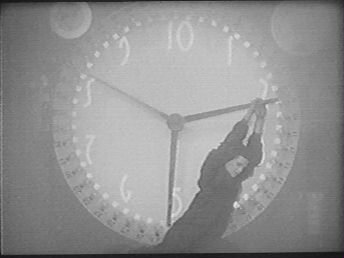 to control the machine, a face of clock is superimposed over the face of the machine. Significantly, it is never clear what that machine, or any of the other machines, produces beyond the labor of those who run the machines.
to control the machine, a face of clock is superimposed over the face of the machine. Significantly, it is never clear what that machine, or any of the other machines, produces beyond the labor of those who run the machines.
Marx explains the alienation that private property causes thus, “Presupposing private property, my work is an alienation of life, for I work in order to live, in order to obtain for myself the means of life. My work is not my life.” The end result of such alienation is the dehumanizing of the worker. In Metropolis, we are first introduced to the workers during a shift change. The workers leaving the shift move at 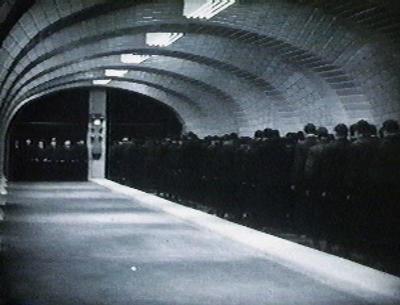 half the speed of the “fresh” workers entering the shift. All of the workers move in lock step, suggesting that they are, in fact, automatons. The scientist Rotwang’s decision to make a machine in to a human is merely the reverse of the process symbolized by the marching workers.
half the speed of the “fresh” workers entering the shift. All of the workers move in lock step, suggesting that they are, in fact, automatons. The scientist Rotwang’s decision to make a machine in to a human is merely the reverse of the process symbolized by the marching workers.
Rotwang is not merely the creator of the Machine-Man. With his mechanical hand, he represents the hybrid of human and machine. Rotwang justifies 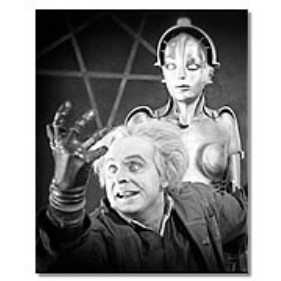 this loss of his hand noting, “Isn’t it worth the loss of a hand to have created the man of the future, the Machine-Man?” Rotwang status as a Machine-Man that he dreams of creating is further suggested by his plans to create a mechanical version of his lover.
this loss of his hand noting, “Isn’t it worth the loss of a hand to have created the man of the future, the Machine-Man?” Rotwang status as a Machine-Man that he dreams of creating is further suggested by his plans to create a mechanical version of his lover.
The dehumanization of the workers is metaphorically extended in the scene where the M Machine is transformed into Moloch. Just before that point, the workers appear to be no more than mere extensions of the machine. It is unclear, in fact, whether they are operating the machine, or the machine is operating 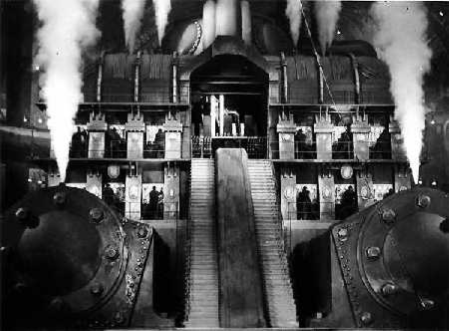 them. While the movie highlights the degradation of the workers in the depths, it would be wrong to assume that they are the only workers alienated from their labor. Pay particular attention to the scene in Joh Fredersen’s office. There, Josephat and the other clerks responsible for overseeing the operations of the city can be seen sweating over numbers. Like the machines which are never shown to actually produce anything, the numbers also seem to be disconnected from any clear productive use, beyond simply producing labor. Still, whatever the machines and numbers represent, they clearly have economic value, for the film tells us, “Fathers for whom every revolution of a machine wheel meant gold had created for their sons the miracle of the Eternal Gardens”.
them. While the movie highlights the degradation of the workers in the depths, it would be wrong to assume that they are the only workers alienated from their labor. Pay particular attention to the scene in Joh Fredersen’s office. There, Josephat and the other clerks responsible for overseeing the operations of the city can be seen sweating over numbers. Like the machines which are never shown to actually produce anything, the numbers also seem to be disconnected from any clear productive use, beyond simply producing labor. Still, whatever the machines and numbers represent, they clearly have economic value, for the film tells us, “Fathers for whom every revolution of a machine wheel meant gold had created for their sons the miracle of the Eternal Gardens”.
The mechanization of people, as described above, would, according to Marx and Engels, be accompanied by a process whereby humans would increasingly be seen as commodities for consumption. The workers in Metropolis, of course, exemplify an apparently endlessly renewable resource. As soon as the first group of workers have died on the M Machine, a new cohort of workers arrives to replace them. While this consumption of humans is most blatant in depictions of the workers, it also occurs in the lives of others. The women in the Eternal Gardens are clearly meant to be “consumed” by Freder. In the scene before Freder enters the garden, one of the young women exhibits her body for the approval of the master of ceremonies. There is no question in her mind about her function in the Eternal Gardens. Significantly, just as Marx and Engels fail to adequately address the question of liberation for women, so too, Fritz Lang’s Metropolis makes no commentary on the lives of these young women who appear, like exotic birds, to be trapped in a gilded cage.
 The idea of the consumption of the female body extends to the erotic dance of the Marie robot. Her dance illustrates the mechanization of the sex industry. Just as the Marie robot is not a real woman, and has no emotional connection to the men for whom she performs, so too, in the modern porn industry, porn stars remain “fictional constructs” who fulfill male fantasies. I hasten to note here that the women who play the porn stars are real, but that the personae that they take on are artificial. Men, of course, are generally not interested in the women behind the porn personae, any more than the men in Metropolis are interested in the robot beneath the veneer of the exotic dancer.
The idea of the consumption of the female body extends to the erotic dance of the Marie robot. Her dance illustrates the mechanization of the sex industry. Just as the Marie robot is not a real woman, and has no emotional connection to the men for whom she performs, so too, in the modern porn industry, porn stars remain “fictional constructs” who fulfill male fantasies. I hasten to note here that the women who play the porn stars are real, but that the personae that they take on are artificial. Men, of course, are generally not interested in the women behind the porn personae, any more than the men in Metropolis are interested in the robot beneath the veneer of the exotic dancer.
Lang’s presentation of the Marie robot has to be given particular credit for foreshadowing some of the criticism of modern feminists. In particular, the scene in which dozens of eyes are superimposed over the dancing robot foreshadows feminist theorist Laura Mulvey’s concept of scopophilia (the pleasure one derives from watching another individual as a sexual object). Scopophilia strips the subject—usually a woman—of her autonomy and of her voice, and transforms her from an active subject to a passive object—a commodity for the enjoyment of the male viewers. As Laura Mulvey explains in her essay, “Visual Pleasure and Narrative Cinema”, “In a world ordered by sexual imbalance, pleasure in looking has been split between active/male and passive/female. The determining male gaze projects its fantasy onto the female figure, which is styled accordingly” (1989, 19). In Metropolis, the male gaze projects its fantasy on to a robot, who is transformed, according to Mulvey, into the “silent image of woman still tied to her place as bearer, not maker, of meaning” (1989, 15). Of course, we must keep in mind that the role assigned to the Marie robot is in no way different from the roles assigned to the living women in the Eternal Gardens. They are all commodities who have been assigned a visual value by the male gaze. Their transformation into commodities for male consumption will be re-echoed in other texts we will be examining, including The Stepford Wives and The Handmaid’s Tale.
Other things you should pay attention to in Metropolis are the religious themes (i.e. names like Marie, references to the tower of Babel and Revelation, and the presentation of the Marie robot as the rebirth of Venus, goddess of sexuality.)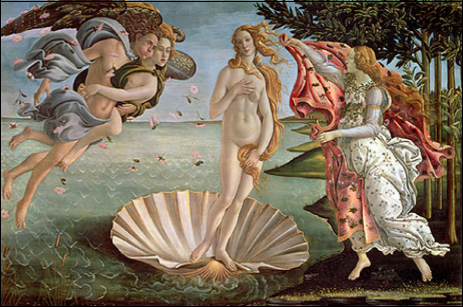
Works Cited
Mulvey, Laura. 1989. “Visual Pleasure and Narrative Cinema.” In Visual and Other Pleasures. London: Macmillan Press, pp. 14-26.